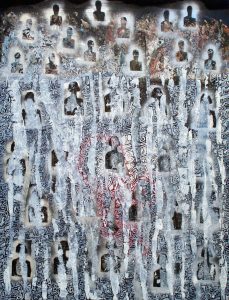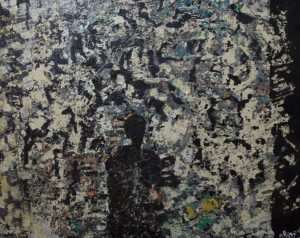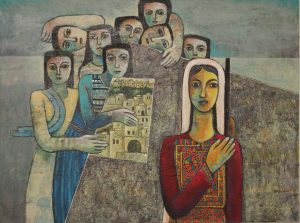The idea of writing a family memoir came to me completely by chance. At the time, I was studying to become a travel reporter, to write about faraway places, to explore new countries, to learn about other cultures and other people’s stories. But every time I was writing about something new, something from my past would enter into my words. The smell of bread in a cottage in Dorset made me write about the focaccia my mother used to buy for me before we went to the sea. Sitting in a car for hours in Morocco made me write about an impossible road trip to Sebastiya. The shades of a courtyard in Chile reminded me of my childhood summers in our house in Ramallah. If it is true that the past is a foreign land, then that was the country my mind kept telling me to visit.
While intentionally noting my memories, however, I soon discovered that remembering is not a straightforward action. Memories don’t just come to you in a linear, precise, and tidy way. They are triggered and shaped by specific events, smells, tastes, and views.

I have now worked for over three years on the implications and complications of writing with memories. I have written about my memories, about my family’s memories. I have worked with interviews, letters, and diaries, and there is nothing more contradictory and nuanced. Now let’s put all of this in the background of the Palestinian question, where historical and political events shape everyday life with an earthquake effect on personal memories: how is it possible to make sense of it? How can we excavate the real value and impact of what we remember?
When I saw the title of this issue of This Week in Palestine, I thought that the best way to approach this topic would be by clarifying some of the terminology around the use of memories: I believe that clarification can shed light on the impact that the studying, sharing, and writing of personal memories can have on understanding our collective past.
Memories: Memories are the material of our remembering. They are what come to our mind spontaneously shaped by external factors, such as Proust’s madeleine, or internal ones, such as nostalgia. Memories are also the very blocks of our identity and form the base for our own idea of self. And they are the foundation for creating a sense of community. Memories, however, are never a pure raw material, an objective and reliable recollection of what happened. They are rather a patchwork of different times and moments and are influenced by what other people said, by other events, and by what our mind wants to remember in order to fit its own narrative.
In this issue you will find many articles that deal with the shifting sands of memories and their influences on identity: impressive, for example, the piece by Tarek Bakri, where he collects the testimonies of Palestinian refugees. The same event becomes a motif thanks to the prism of memory, and we can see how different generations and different places have lived the same historical moment: “Today, after all these years, three generations went back to Palestine – me, my children, and my grandchildren – to look for my home and recall my memories.” (See Page 32.)

Diaries, letters, recordings, etc., but we could now add social-media pages, selfies, blogs: These are mediated forms of memory. To make the material of our memory understandable on the page, we rework it, we try to give it a meaning and an order of some kind. Think about writing a page in your daily journal: memories of your day will come to you by importance or by emotions or by priority; however, you would probably write them down in chronological order, or you would try to reflect on what happened. Even more if you are writing a letter – or an email – to someone. Then your memories need to take the shape of a simple story, to be explained, put into context. In other words, diaries, letters, and other similar forms will neither report the event as it happened nor will they report the event exactly as it is in our memory. They will rather present another stage of remembering – a less spontaneous but still informal relationship with the past. In this regard, the article by Anas Abu Oun about the difficulties of putting together an exhibition from the abundant material of El-Funoun’s archive is exemplary. (See page 66.)
Memoirs: Memoirs are a literary genre that works with one’s personal memories or with other people’s memories, or with both. To be able to write a full narrative from the ambiguous and inadequate material of memories – or diaries and letters if used – the author of memoirs will borrow many writing techniques from fiction. When writers start to write a memoir, they are not just remembering, they are weaving a narrative of events that have already happened; they know the full trajectory of that part of the story/history, and they write it with a specific agenda in mind – what message they want to give to the reader, which readers they are writing for, which facts to include, and which not.

This makes of memoirs a further stage of remembering. Even if based on memories, they are a proper rewriting of the past, a search for meaning to deliver meaning.* You will find really interesting the piece by Jacob Norris. The author explains: “The book is a work of creative history that mixes detailed empirical research with fictional styles of writing borrowed from genres such as magical realism and the Palestinian khurrafiyya to capture the spirit of confusion, wonder, and encounter that marked this period [end of the nineteenth century] of Bethlehem’s history.” (See page 48.)
Briefly, memories, diaries, etc., and memoirs are not a reliable account of the past. In fact, they are deceptive. So why should we pay attention to them, read them, or collect them? Why are they so important? And in particular, why are they so important in Palestine? Are we not already fed up with distortions of our history, misappropriations, omissions?
My opinion is that the unreliability of memories, diaries, and memoirs is what makes them so important. The image that they render is not one based on pure fact, it is rather about our feelings, our points of view about the facts, our unconscious reactions to the facts. When I write about my memories of the second Intifada, for example, I would not remember exact dates, but I would probably remember exact sounds or what the journalist was wearing on TV, and I would probably mix up events that are days or even months apart. Those sounds, however, those random details, and those mix-ups would disclose a deeper reality: they would not tell us about facts of history, but they would put us in touch with the moods and the emotional reactions that we have when confronted with history. To understand more about this reality, I suggest that you read the article by Ali Qleibo on the memoir of Hala Sakakini. It contains all the nuances that a work on personal memories can have and all the controversy it can spark. But in this article, Ali is also able to create an original and provocative historical analysis out of the gaps and partialities of Hala Sakakini’s account: “‘Reality’ was misconstrued. The ensuing lacuna among educated Palestinian middle classes impeded their perception and appraisal of the imminent Zionist threat.” (See page 6.)
Memories, diaries, and memoirs are invaluable sources that help us to understand the spirit of the past, to look at the present with more awareness, and to leave to the future a more conscious account of what we are living. So I invite you to read this issue of This Week in Palestine as an anthology of texts that speak to each other, with memories passing through all of them like an electric wave that transforms personal experience into the collective heritage of Palestine.
*The same applies to museums, museum-archives, and exhibitions. None of these environments are simply a gathering of material; rather, they provide a means to organize it, label it, display it, and curate it, following specific rules, goals, and agendas. Once more, the article about the El-Funoun archive is a great example of the compromises and choices that need to be made in order to render communicable the material of our memories.


